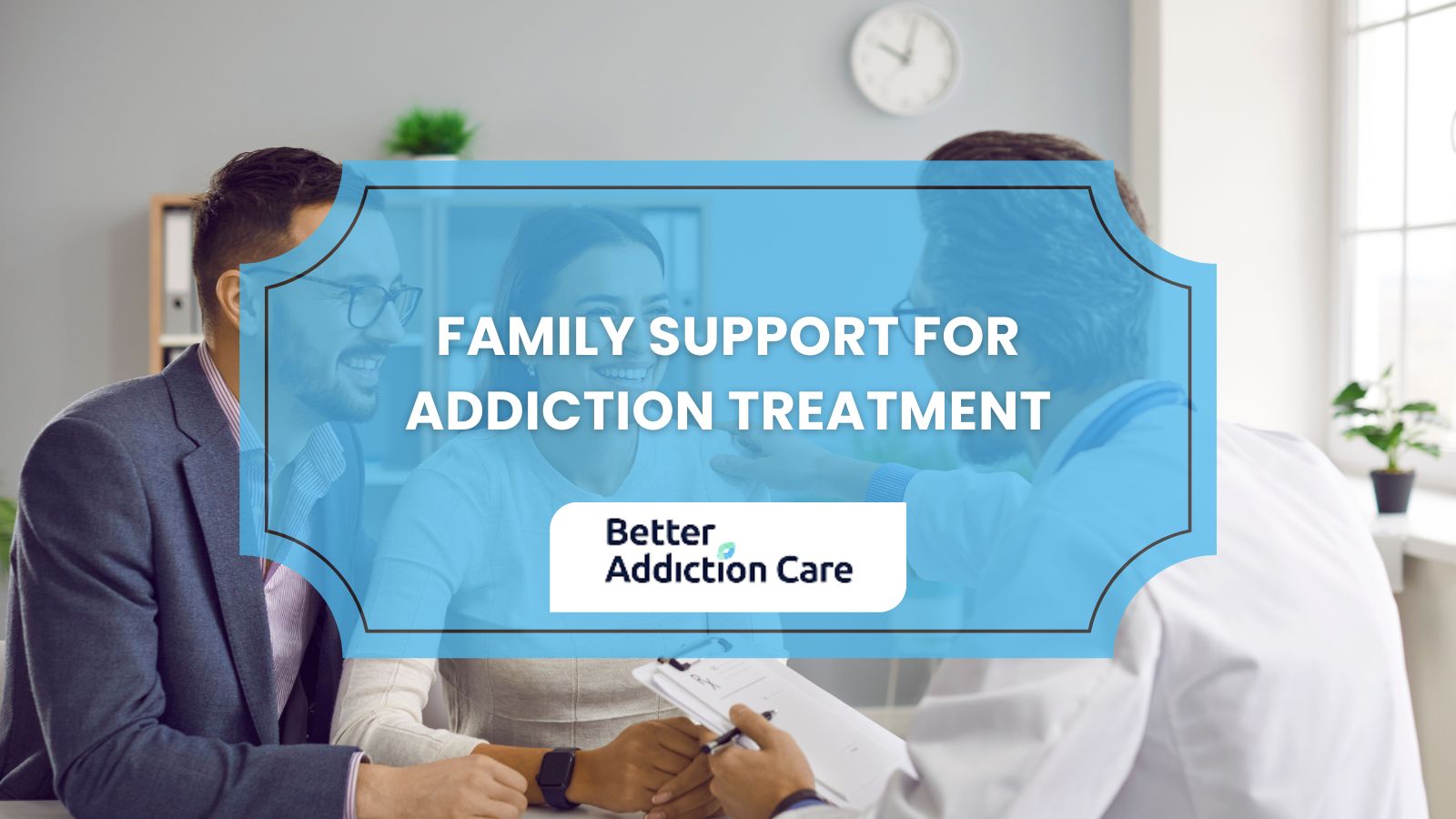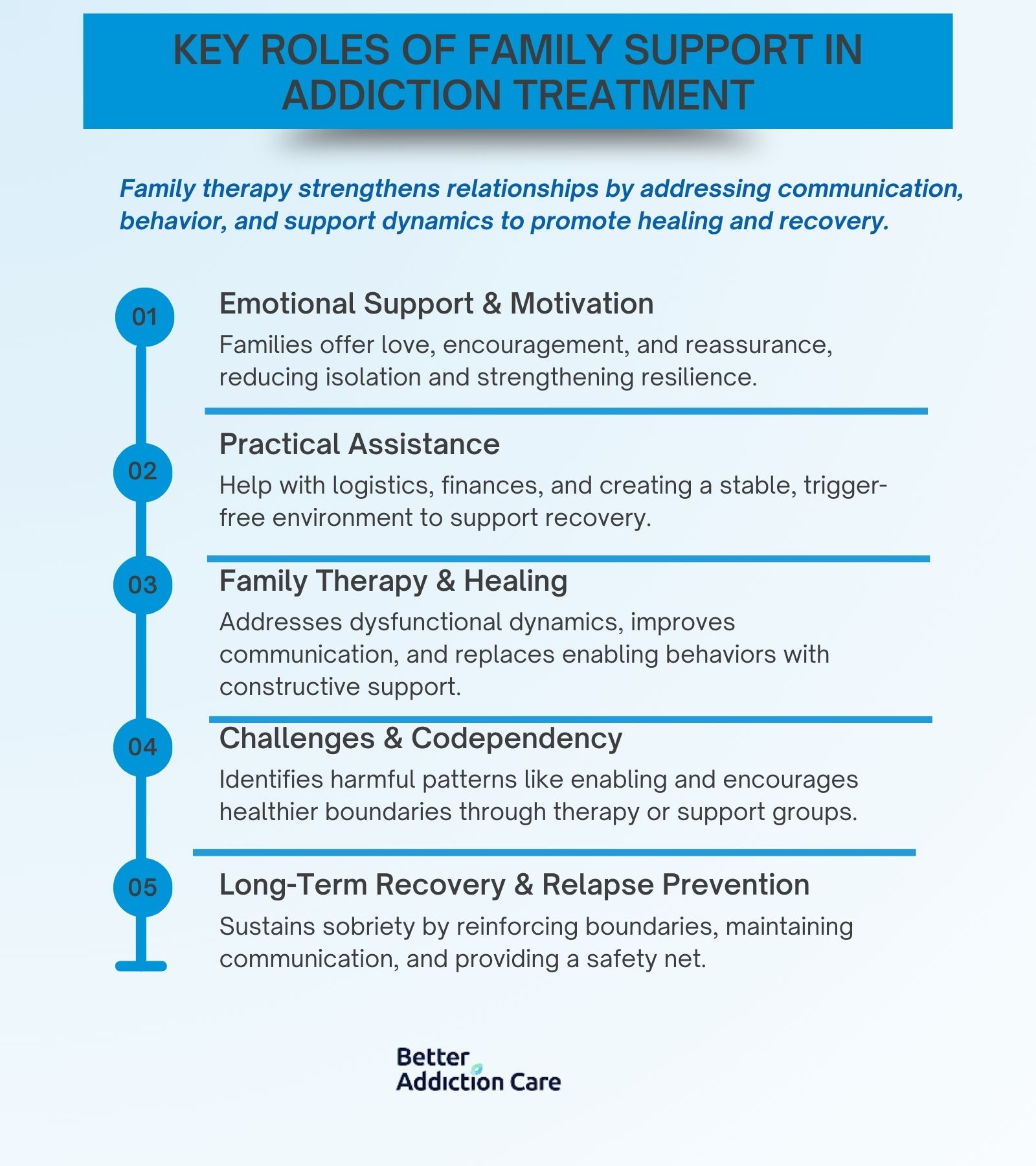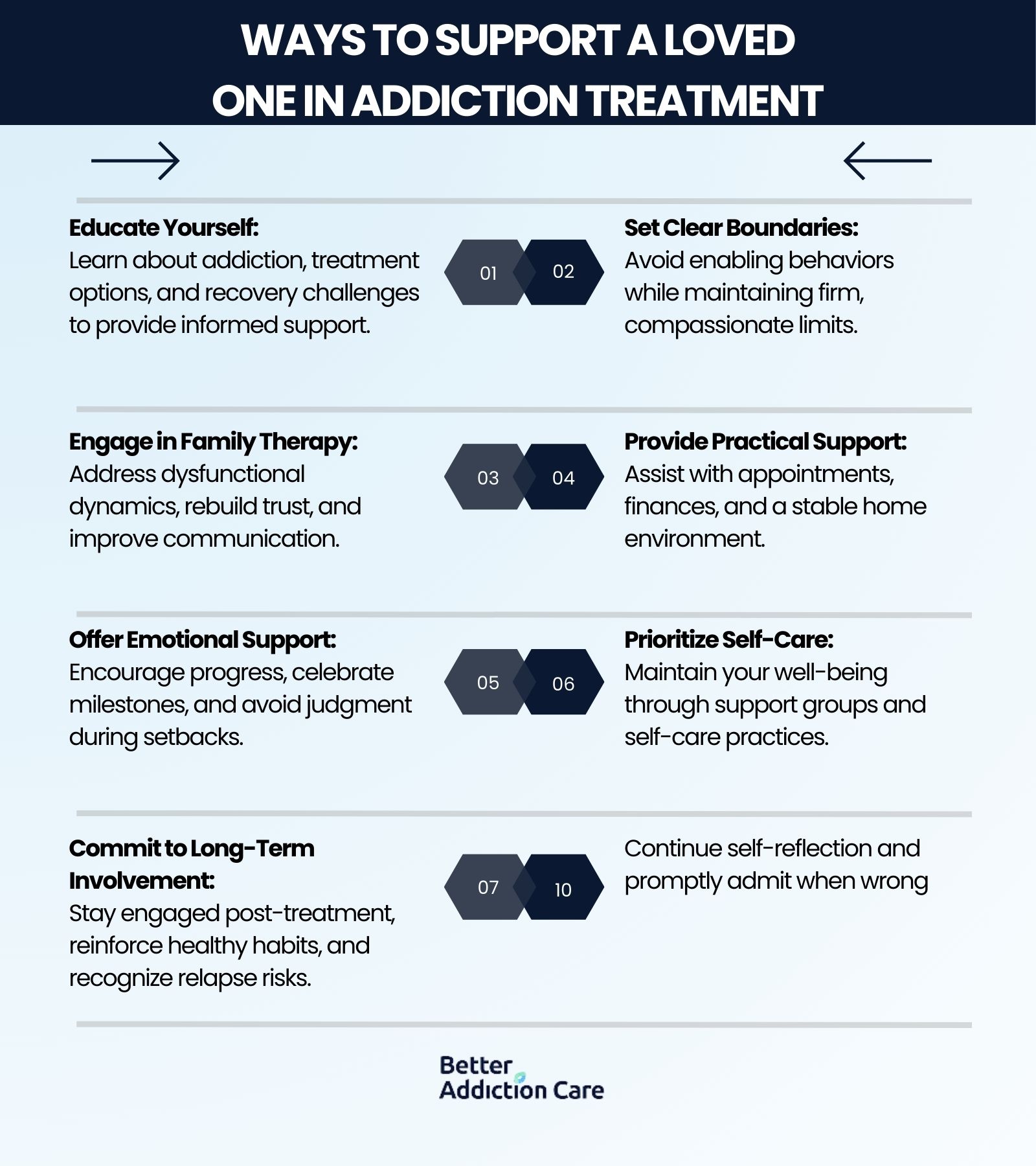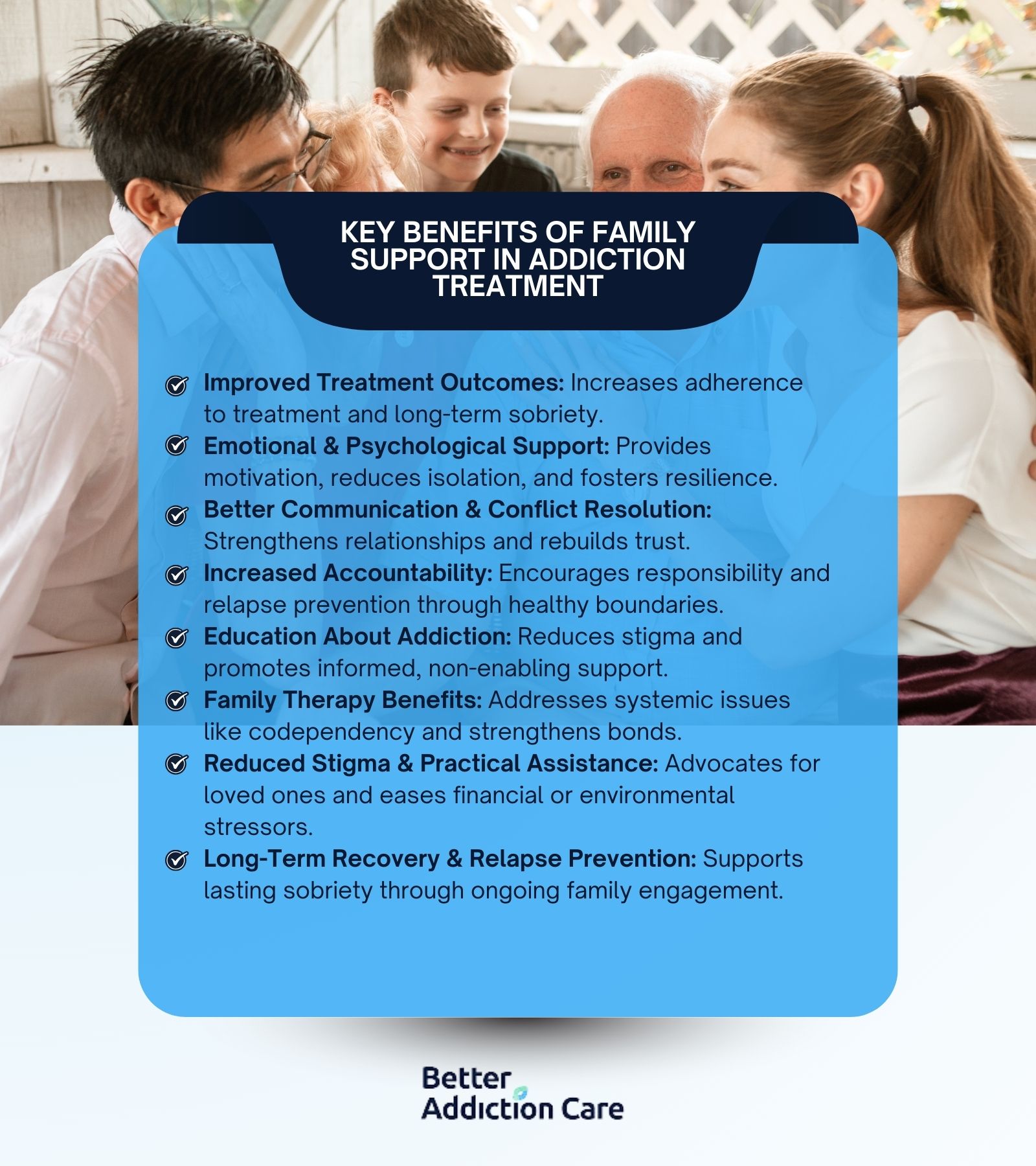Family Support for Addiction Treatment

Family support for addiction treatment encompasses both emotional and practical assistance provided by loved ones, alongside structured interventions like family therapy, which addresses systemic relational dynamics to foster accountability and sustainable recovery. While family members offer encouragement, stability, and motivation, therapy targets communication breakdowns, codependency, and enabling behaviors, creating a cohesive framework for collective healing and long-term sobriety.
Family therapy is a systemic approach that addresses challenges within a family unit by exploring relationships, communication styles, and behavioral patterns to promote healing and resilience through collective accountability and positive changes in familial dynamics.
According to Hogue, A.’s 2021 study, ‘Family Involvement in Treatment and Recovery for Substance Use Disorders among Transition-Age Youth: Research Bedrocks and Opportunities, ’ substance use disorder treatment for transition-age youth (15-26), family therapy demonstrates significant effectiveness in addressing addiction. Studies confirm family-involved treatment produces a 5.7% reduction in substance use frequency, equivalent to three fewer weeks of use per year. Meta-analyses establish that family therapy approaches outperform other treatment modalities, with benefits lasting up to 18 months post-treatment.
Family support plays a crucial role in addiction treatment by providing emotional validation, practical assistance, and participation in family therapy to foster resilience and address dysfunctional dynamics. With proper education and boundaries, families avoid enabling behaviors and contribute to sustainable sobriety and collective healing.
To support a loved one in addiction treatment, educate yourself about the condition, set clear boundaries, and engage in family therapy while providing practical assistance without enabling behaviors. Prioritizing self-care and committing to long-term involvement fosters a healthy recovery environment and maintains your well-being.
Family support for addiction treatment offers benefits such as improved treatment outcomes, emotional stability, and enhanced communication, significantly increasing the chances of successful recovery. By fostering accountability and providing education about addiction, family involvement creates a comprehensive support system that promotes long-term sobriety.
What is Family Therapy?
Family therapy is a systemic approach that explores the complex interplay of relationships, communication styles, and behavioral patterns within a family unit to address challenges such as addiction, mental health struggles, or relational conflicts. Viewing the family as an interconnected system seeks to identify how individual struggles are influenced by—and alleviated through—changes in familial dynamics. This collaborative process involves guiding families to recognize and modify harmful behaviors (e.g., enabling, poor boundaries), foster empathy, and rebuild trust, to create a supportive environment that promotes healing and resilience. Unlike individual therapy, it emphasizes collective accountability, treating the family as a source of stress and a vital resource for sustainable recovery and growth.
What is the Role Of Family Support for Addiction Treatment?

The role of family support for addiction treatment encompasses emotional validation that reduces isolation, practical day-to-day assistance that minimizes stressors, and participation in family therapy to address dysfunctional dynamics. However, families must be careful to avoid enabling behaviors and codependency patterns that undermine recovery efforts. With proper education and boundaries, family involvement provides crucial long-term support for sustainable sobriety and collective healing.
However, According to Supriyanto, A.’s 2021 study, ‘Addiction counselor profession: Perception of family support for recovering from drug abuse addiction.’, a study of 217 individuals in drug rehabilitation programs found that most substance users (57.14%) perceived low levels of family support, while smaller percentages reported high (33.18%), very high (7.37%), or deficient (2.30%) support. These findings indicate that family influence remains minimal during rehabilitation, despite its critical importance to recovery. The researchers recommend implementing family counseling services that provide concrete, emotional, informational, and reward-based support.
Here are the key roles of family support for addiction treatment:
-
Emotional Support and Motivation: Families provide a foundation of love, encouragement, and understanding, which helps individuals stay motivated during recovery. Emotional validation from loved ones reduces feelings of isolation and shame, fostering resilience. For example, family members celebrate milestones, offer reassurance during setbacks, and model healthy coping mechanisms.
-
Practical Assistance: Families often assist with daily logistics, such as ensuring access to treatment programs, managing finances, or creating a stable home environment free of triggers. This practical support reduces stressors that might otherwise hinder recovery.
-
Family Therapy and Systemic Healing: Family therapy addresses dysfunctional dynamics (e.g., enabling, poor communication) that contribute to addiction. By improving trust, boundaries, and conflict-resolution skills, therapy helps families become a source of accountability rather than conflict. For instance, sessions focus on identifying enabling behaviors and replacing them with constructive support strategies.
-
Challenges and Codependency: Families unintentionally perpetuate addiction through codependency or enabling (e.g., covering up consequences of substance use). Recognizing these patterns and seeking guidance, such as through therapy or support groups like Al-Anon, is vital to avoid undermining recovery.
-
Long-Term Recovery and Relapse Prevention: Ongoing family involvement helps sustain sobriety by maintaining open communication, reinforcing boundaries, and providing a safety net during high-risk situations. Families also benefit from healing collectively, as addiction often strains relationships.
How To Support A Loved One In Addiction Treatment?

To support a loved one in addiction treatment, educate yourself about the condition, establish clear boundaries, participate in family therapy, and offer practical assistance without enabling behaviors. These strategies create a foundation for healthy recovery while maintaining your well-being.
Here are the common ways to support a loved one in addiction treatment:
-
Educate Yourself About Addiction: Understanding addiction as a chronic health condition helps families avoid blame and provide informed support. Learning about treatment options, relapse triggers, and recovery processes equips you to engage constructively.
-
Set Clear Boundaries: Establishing firm but compassionate boundaries prevents enabling behaviors, such as covering up consequences or providing financial bailouts. Consistency in enforcing these boundaries promotes accountability.
-
Engage in Family Therapy: Participating in therapy sessions addresses dysfunctional dynamics, improves communication, and rebuilds trust. This systemic approach helps families heal collectively while supporting the individual’s recovery.
-
Provide Practical Support: Assist with logistical needs like scheduling medical appointments, managing finances, or creating a safe home environment. Reducing external stressors allows the individual to focus on recovery.
-
Offer Emotional Support Without Enabling: Encourage progress through empathy and non-judgmental communication. Celebrate milestones and avoid criticizing setbacks, fostering a safe space for open dialogue.
-
Prioritize Self-Care: Family members must maintain their mental and physical health to avoid burnout. Joining support groups like Al-Anon provides tools to navigate challenges while staying emotionally grounded.
-
Commit to Long-Term Involvement: Recovery is a lifelong process. Stay engaged by recognizing relapse risks, reinforcing healthy habits, and adapting to evolving family roles post-treatment.
What Are The Benefits of Family Support for Addiction Treatment?

The benefits of family support for addiction treatment include improved treatment outcomes, emotional stability, enhanced communication, greater accountability, and addiction education. Family involvement creates a comprehensive support system that significantly increases the chances of successful recovery and sustained sobriety.
Cai, W.’s 2022 study, ‘Family Support and Hope among People with Substance Use Disorder in China: A Moderated Mediation Model, ’ family support correlates strongly with both resilience and hope (99.9% statistical certainty). Resilience mediates 35.71% of family support's effect on hope. Family support directly increases hope and indirectly boosts it through enhanced resilience. No differences in family support exist between relapse and non-relapse groups, though non-relapsers score higher on resilience and hope measures.
Here are the key benefits of family support for addiction treatment:
-
Improved Treatment Outcomes: Family involvement significantly enhances the likelihood of long-term sobriety. Studies show that when families participate in recovery, individuals are more likely to adhere to treatment plans and maintain progress.
-
Emotional and Psychological Support: Families provide a stable foundation of love and encouragement, reducing feelings of isolation and shame. This emotional safety net helps individuals stay motivated during challenging phases of recovery.
-
Better Communication and Conflict Resolution: Family support fosters open dialogue, addressing misunderstandings and rebuilding trust. Improved communication reduces conflict and creates a collaborative environment for healing.
-
Increased Accountability: Families help set and enforce healthy boundaries, discouraging relapse. By holding loved ones accountable without judgment, they promote responsibility and adherence to recovery goals.
-
Education About Addiction: Families that educate themselves about addiction understand its chronic nature and treatment requirements. This knowledge reduces stigma and equips them to provide informed, non-enabling support.
-
Family Therapy Benefits: Therapy sessions address systemic issues, such as codependency or enabling behaviors, while strengthening relational bonds. This systemic approach improves outcomes for both the individual and the family unit.
-
Reduced Stigma and Practical Assistance: Families mitigate societal stigma by advocating for their loved one. Practical support, like managing finances or creating a safe home environment, also alleviates stressors that might hinder recovery.
-
Long-Term Recovery and Relapse Prevention: Ongoing family engagement helps sustain sobriety by recognizing triggers, celebrating milestones, and adapting to evolving needs. This long-term commitment reduces the risk of relapse.
How Does Addiction Impact Families?
Addiction impacts families by causing emotional turmoil, creating financial instability, breaking down relationships, and leading to social isolation. Family members often experience anxiety, shame and develop codependent behaviors, while children face potential trauma that affects their development.
Here are the top ways addiction impacts families:
-
Emotional Turmoil: Family members often experience anxiety, shame, and helplessness as addiction disrupts trust and stability. Loved ones blame themselves for the situation, leading to chronic emotional exhaustion.
-
Financial Instability: Direct costs of substances, legal fees, or lost income strain household budgets, pushing some families into debt or poverty. This pressure intensifies conflict and limits access to basic needs.
-
Broken Relationships: Addiction erodes communication and intimacy, replacing them with hostility or avoidance. Family roles shift unpredictably, such as children becoming caregivers, destabilizing the household.
-
Social Withdrawal: Stigma or embarrassment leads families to isolate themselves, cutting ties with friends or community networks. This isolation deepens loneliness and reduces external support.
-
Childhood Trauma: Children in addicted homes face neglect, emotional scars, and academic struggles. They are more likely to develop mental health issues or replicate addictive patterns in adulthood.
-
Physical Health Decline: Prolonged stress from managing addiction weakens immunity, triggers insomnia, or contributes to conditions like hypertension among family members.
-
Codependent Behaviors: Family members enable addiction by shielding the individual from consequences (e.g., paying bills, lying to employers), inadvertently prolonging dependency.
-
Long-Term Resentment: Even after recovery, unresolved trust issues or bitterness linger, requiring intentional effort to rebuild relationships and restore family cohesion.
Why Supporting Recovery Makes a Difference?
Supporting recovery makes a difference because it goes beyond helping someone overcome substance dependence—it creates opportunities to rebuild relationships damaged by addiction.
Recovery brings transformative benefits, including improved mental health, physical wellbeing, and restored connections with loved ones. Your support demonstrates to the person that positive change is possible and that others care about their journey. This encouragement often becomes the crucial motivation that helps them maintain their recovery path.
The recovery journey begins with acknowledging the problem, followed by connecting with qualified treatment professionals. Effective recovery requires a treatment team that addresses specific needs and offers convenient accessibility. When recovery feels personalized and accessible, it transforms from a perceived burden into a positive step forward in the person's life.
What Is the Difference Between Family Therapy and Individual Therapy?
The difference between family therapy and individual therapy lies primarily in their focus, structure, and therapeutic goals. Family therapy concentrates on relational dynamics and communication patterns within the entire family system, treating the unit as a whole to resolve conflicts and improve interactions. Therapists might examine how family roles or behaviors contribute to stress, working to foster healthier connections between members. Individual therapy, by contrast, addresses a person's internal struggles, such as addiction or mental health challenges, through one-on-one sessions that develop personal coping skills and self-awareness. While family therapy emphasizes collective healing and system-wide change, individual therapy prioritizes personalized growth and provides greater privacy. Both therapeutic approaches complement each other, depending on specific circumstances and the needs of both individuals and families.
How Can I Find Local Alcohol and Drug Rehab/Treatment Facilities?
You can find local alcohol and drug rehab/treatment facilities by using the free resources offered by Better Addiction Care. Whether you're searching for help for yourself or a loved one, these resources connect you with treatment facilities that match your specific needs. Begin finding local options immediately through our free online local directory of drug and alcohol abuse treatment or rehab facilities.

